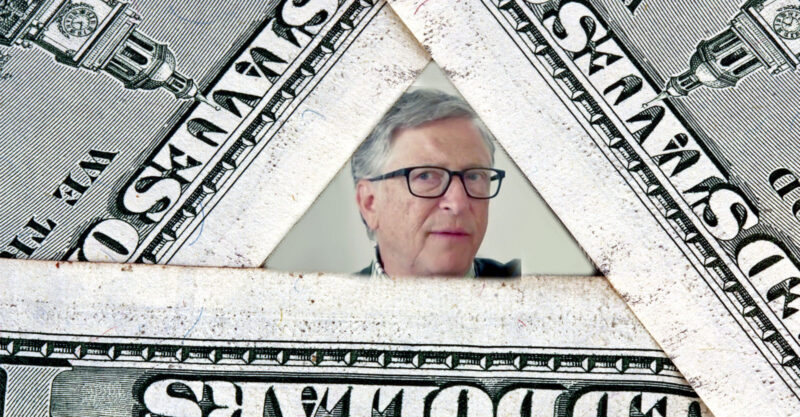by Dr. Joseph Mercola, Childrens Health Defense:
 Millions trust the U.S. Food and Drug Administration to regulate Big Food and Big Pharma without realizing that Bill Gates and other members of the private sector are pulling the strings behind the scenes.
Millions trust the U.S. Food and Drug Administration to regulate Big Food and Big Pharma without realizing that Bill Gates and other members of the private sector are pulling the strings behind the scenes.
Story at a glance:
- While the U.S. Food and Drug Administration (FDA) itself does not accept corporate money, it does receive money funneled via a nonprofit foundation, which receives money from other nonprofits funded by private interests.
TRUTH LIVES on at https://sgtreport.tv/
- The Reagan-Udall Foundation is a nonprofit foundation created by Congress in 2007 to support scientific research that is of interest to the FDA. It accepts grants from the government, individual donors and other nonprofits — even when those nonprofits are created and funded by industry.
- The Reagan-Udall Foundation has received large donations from the Bill & Melinda Gates Foundation.
- Ellen Sigal, who currently chairs the Reagan-Udall Foundation’s board of directors, is also vice president of the Cancer Moonshot program, funded by the Gates Foundation, and she’s on the board of the Parker Institute, which is partnered with Inovio, a Gates-funded company that is currently working on a COVID-19 vaccine.
- According to the rules, no more than four of the 14-member board of the Reagan-Udall Foundation are supposed to be representatives of FDA-regulated industries, yet in 2017, nine of the then 13-member board had financial ties to industry at the time of their appointment.
If you’re like most people, you probably assume that the FDA is funded by the U.S. government and therefore isn’t catering to private industries.
The agency itself certainly tries to present itself as independent from the industries it regulates but, in reality, legal loopholes have led to the FDA receiving money from, and being captured and corrupted by, private interests.
While the FDA itself does not accept corporate money, it does receive money funneled via a nonprofit foundation, which in turn receives money from other nonprofits funded by private interests. It’s really all a façade because the end result is the same. Those donating the money ultimately end up with the ability to pull strings, when needed.
The Reagan-Udall Foundation
As explained by NPR back in 2012, the Reagan-Udall Foundation is a nonprofit foundation created by Congress in 2007 to support scientific research that is of interest to the FDA. According to NPR:
“The idea was that this foundation could do things the FDA can’t. It would raise money from private sources, fund research in areas where the FDA lacks expertise, and organize collaborations involving industry, patient groups and academia.”
As explained in a 2008 article in the Journal of the National Cancer Institute, the creation of the Reagan-Udall Foundation was part of a larger plan to establish a private-public partnership to facilitate the Critical Path Initiative.
The Critical Path Initiative was part of the FDA’s attempts to streamline and modernize the drug approval process by having companies pay user fees. Part of the Reagan-Udall Foundation’s responsibilities was to set goals and priorities for the Critical Path Initiative, and then award grants to meet those goals.
Massive loophole: nonprofits funded by industry
However, critics voiced concern, saying the Reagan-Udall Foundation might allow the food and medical industries “to sway FDA decisions,” since it could raise money from private, including industry, sources.
To quell some of these fears, the Reagan-Udall Foundation said it would only accept grants from the government, individual donors and other nonprofits, not industry.
After a few years of scraping by on small, private donations, the foundation received a $150,000 grant from the PhRMA Foundation, another nonprofit foundation funded by drug companies.
Being a nonprofit, the PhRMA Foundation fits the description of an acceptable funding source, but just how independent can it actually be when it’s founded and funded by drug companies?
As noted by consumer advocate Sidney Wolfe with Public Citizen, while the PhRMA Foundation is technically a nonprofit, “one can hardly expect that they’re going to do things that are not in the interests of their funders.”
Read More @ ChildrensHealthDefense.org





